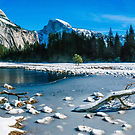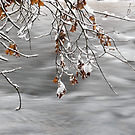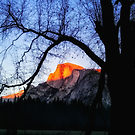The Outdoor Club really needs every Yosemite winter trip member to read all of this and help us enforce rules during the trip.
When any De Anza club/class camps as a group we face this problem: Someone in a nearby campsite will expect the worst (noise, etc.) from an obviously college-age group. And they will be quick to complain about any rule infraction (some of which can result in heavy fines, impoundment of property (including your food and car) or revocation of camping permit – you pack up and leave the park).
The Outdoor Club has been very successful in combating this. We’ve had rangers tell us we had the cleanest group campsite they’d ever seen (it wasn’t hard). This section mentions some problems we’ve had in the past when people weren’t thinking, or just didn’t care, but it isn’t meant to make you think the club has had a lot of problems, because we haven’t. (The few instances are from 30+ years of club winter trips.)
In early 1998 the insurance company wanted to keep us from doing ocean kayaking, because it is statistically dangerous, but the De Anza Risk Management office spoke up for us – because we have a good reputation.
We keep a clean, non-smoking campsite and strictly follow all park rules, especially about food storage.
If this were a younger group, state law would say all the students need to be ‘in line of sight’ of the faculty member on the trip. So we’d have to do all of the same activities, and hike like a string of ducklings.
Since we’re older, we get some breaks. The first morning prehike group meeting / evening campfire, optional breakfast together the last morning and some years, possible tour(s) with faculty are the only ‘official’ club events. If you go ice skating, biking, climbing, skiing, sledding or snowboarding you’re on your own. Where you stay overnight is your responsibility. Yet you are still expected to follow all park rules and use reasonable safety precautions. You’re expected to let us know where you’re going and when you’ll return (and to check in when you do). Carpools are expected to use safe cars, wear seatbelts, and have drivers with insurance. Climbers, cyclists and roller bladers (including over 18 years old), are expected to wear helmets.
Basically, we’re not being treated like fourth graders, and we need to assume responsibility. The Outdoor Club has a good reputation at De Anza; we intend to keep it that way and keep the freedom we have to try new things. Please don’t join our trip if you can’t get along with these rules.
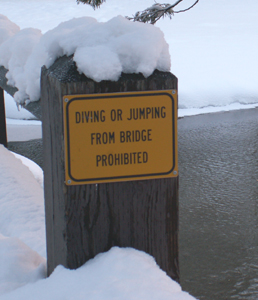
https://www.nps.gov/yose/planyourvisit/campregs.htm
Some things we’ve tried that work, especially if you plan ahead
Bring (borrow?) thermoses.Then you can go on a night hike and have hot chocolate ready and waiting for you afterwards without banging around pans at 2 a.m. to heat it. On summer night hikes we’ve brought backpacker’s size stoves to make hot chocolate, but in the winter you don’t want to stop that long on a night hike, it’s just too cold. (No, the screw-top water bottle you should bring on all walks or hikes won’t freeze in the time you’re out hiking, it’s only likely to partway freeze overnight in your tent/ tent cabin, so you won’t need to carry a heavy thermos on long hikes for water.)
Get the evening’s and morning’s wood supply that you buy in the park split early so you have enough light to do it safely / or buy Presto logs type firewood and make it easy (and legal).
We will try to get all our campsites in a row next to each other. If we can, campfires will be restricted to one or two center area campsites so we have a buffer of non-campfire sites between us and other people
A large group like ours is bound to be noisy at times, but noise is the first thing other campers complain about to the Rangers. When a friend who is enjoying herself immensely starts singing loudly at midnight, please remind her that people are trying to sleep.
Turn off the car stereo before you enter the campground, and don’t use your car stereo to broadcast music to the campsite. The best music solution really is to bring headphone cassette players so you can play whatever music you want as loud as you want. We promise not to snicker too much at your air guitar but we might place bets on which song you’re listening to. Or skip the music and listen to Mom Nature’s avalanches, and if we’re lucky, coyotes singing.
The club encourages acoustic guitars if everyone nearby wants to hear them, but does not allow drums, tubas, ….
There will be coyotes and raccoons IN the campsites. (Experience shows they sing better than some De Anza students.)
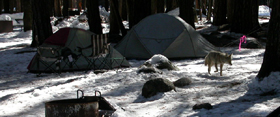
If you arm your car alarm it will go off when a coyote (or a bear that woke up from hibernation) puts his paws up on a window to get a look inside, waking up the whole campground. If you think you really need to use your car alarm, someone can drive you back when you park your car at day-use.
! ! ! ! Tent walls are thin. You can wake up everybody in the vicinity ! ! ! ! when you want to get into your car and you use the keyless (remote) door opener and the car makes the usual loud beep. People don’t think to just use the key to open the door or don’t know that if you look in the owner’s manual you can find a way to disable the beep. On De Anza Outdoor Club trips you are required to either disable the beep or not use the remote (remove it from your key chain during the trip) or park at day use instead of at the campground.
Some vehicles have a beep activated whenever you open the trunk, that can’t be easily disabled. Every time the trunk is opened it beeps and it will wake up people on our trip and in neighboring campsites / tent cabins. If your vehicle has this function, either look in the owner’s manual for info on how to disable the beep or take it to the dealer and get it done, or do not park it at our campground.
If you rent a vehicle you should learn how to turn off car alarms/disable beeps at the rental business, BEFORE you leave for the trip and be sure the rental company will let you use chains.
If you want to talk to someone in another campsite, go there and talk, don’t yell.
No alcohol consumption. It’s especially dangerous in the outdoors in winter.
This rule is not just mentioned to make the college happy, it is a trip rule.
It’s tempting to hang out in the dry, heated restroom when it’s raining, and a few girls did on the ’98 trip. They also invited a guy into the women’s restroom to talk. If another camper had walked in on them before one of our group did, we all would have been watched closely by the Rangers for the rest of the trip (and the guy in the restroom could have ended up in jail- yes, there is a jail and courthouse in Yosemite Valley).
So the idea is to think about whether others would be offended, annoyed or complain about your actions, and not be afraid of telling someone else on the trip when they are blowing it. (Not to mention that voices are amplified from the restroom – if you need a dry place to hang out make it the laundromat, cafeteria or your tent).
Do not walk through other group’s campsites to get to the restroom, to the bus, to another of our sites.
You must bring at least one full length insulating sleeping pad (two are really better) and not just sleep on an air mattress, a blanket or the ground; bring enough warm gear and clothes, decent sleeping bag, extra blankets, etc. that you will not think you need get into your car at night and run the engine to warm up (thereby waking up everyone in the vicinity and possibly running down the battery so the car won’t start later).
Snowballs can hurt. Pack them loosely with no rocks. Plan never to aim at someone’s head. Toss them rather than aim a super fast ball. Move your snowball fight to an empty area of the campground instead of within our sites so people who don’t want to participate don’t have to. Never throw them directly at animals you want to shoo away from the campsite.
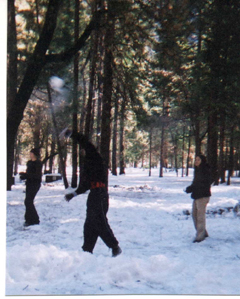
Also follow the specific park rules (count on it, someone will report you to the rangers).
Please don’t hike or snowshoe in Nordic (cross-country) ski tracks. Walk alongside, but not in the ski trail.
Bikes are not allowed on hiking or ski trails or off trail, only on bike paths and roads. Winter weather in Yosemite Valley frequently is nice enough for bike riding or roller blading, but you must wear a helmet, even if you are over 18. No snowmobiles. No personal snowplows either, wise guy.
Park rules require that we sleep six people to a campsite, so sorry, you can’t pitch all the tents for multiple sites together in one site. People learned this the hard way years ago when the Rangers made us move tents and all that gear in them when people ignored this rule. Yes, we might have 2 vehicles with a total eight people in one campsite, but we have to spread out the tents/sleeping arrangements.
Don’t collect firewood in Yosemite valley (it’s all green and smokes anyway). Don’t cut branches off trees, or collect rocks, pine cones, flowers or any natural specimens anywhere in the park. No chainsaws. No hunting. No firearms on club trips.
Smoking campfires cause a lot of pollution in Yosemite Valley. (Campfires are not allowed in the morning most of the year because of this.) Yosemite rules say fires must be put out completely using water. People have gotten into arguments over this one. Yes, at some places you can bury a fire in dirt, but not in Yosemite. Use water, lots of it, and get the fire completely out so it isn’t smoking at all.
First-timer’s instructions has detailed instructions on how to put out the campfire.
Don’t leave a campfire unattended even for a few minutes. No, the people in the next campsite are not going to take responsibility for it while you go to the store. Big fines (that you will pay, not the club / college) and a couple was blacklisted from future club events for this one.
Quiet hours are 10 p.m. to 6 a.m., and to go on this trip you will have to agree to:
- follow campground quiet hours rules. It is impossible to keep a big group of people around a campfire quiet late at night. The De Anza group was told by a Ranger to pack it in and be quiet in 2002 because of this. Another group in the campground was kicked out of the park that night because of noise. (Yes, the rangers made them pack up their tents/gear in the middle of the night and totally leave the park.)
- start being fairly quiet two hours before the quiet hour (8 p.m.).
- cheerfully help put out the campfire at 9:50 p.m. and go on a night hike (and return from the hike whispering at the most) if you want to stay up past the 10 p.m. quiet hours start
Please respect the quiet rules even if the nearby motor home is ignoring the no-generators hours. From a park service webpage early 2017: “Generator use is allowed only from 7 am to 9 am, noon to 2 pm, and 5 pm to 7 pm. Generator use is not allowed at other times.” (subject to change).
Don’t dig trenches around your tent. Even if it’s really, really, really wet. It’s okay to remove any pebbles, stones, pinecones, etc. from where you will pitch the tent.
No feeding any animals. Those Cheetos aren’t good for you and they’re worse for the squirrels.
The park’s stream and river fishing season is closed for the winter.
Store food in one of the campsite bear boxes with the latch completely slid down into place and latched, or with it double clipped, if that’s the kind in your site. Use both latches if there are two. Photos of the latching system on one kind of campsite food storage locker are at: Using a campsite food storage locker The Rangers expect us to shut and latch the door to the campsite food storage box immediately after moving anything in or out and stay within arm’s reach of anything out at a picnic table. (The park service says food farther than arms length is too far away and behind the back is an invitation to animals.)
Your shower kit has toothpaste and other things that smell like food to animals. Store it in the metal bearbox, too.
Get the food/toiletries out of your vehicle right away. In 2005 Yosemite started warning: “Bears break into cars during the day time. So even while on a day hike, store all scented items in lockers.”
Puuuuuulease get rid of the dashboard hula girl that emits the pina colada scent, (only $2.99 at the Frys one day Flash Sale and you couldn’t resist) and everything else scented from your vehicle so the bears won’t be tempted to break in. Stop stuffing the ashtray with gum wrappers. Dig the old french fries out from under the seats.
No food can be left out while people are gone from the campsite, even for a short trip to the trash bin. Raccoons, coyotes or bears get into the bear-proof campsite food storage box if you leave the door open for just a minute while you turn your back.
People used to be able to store food out of sight in their car trunk, or in the car with a blanket over it, but the bears have gotten good at recognizing the shape of an ice chest, or just noticing smells coming from passenger compartments or trunks. They put their claws into the top of your locked door and will pry it open like a sardine can lid. Then they will claw out the back seat to get into the trunk. After getting your food, they could go for the next car, even if it doesn’t have food in it, so don’t risk other people’s cars by making the mistake of thinking it won’t happen to you.
—- The bears don’t fully hibernate all winter in mild winter places like Yosemite and would like to get into your car, as in these Park Service photos:
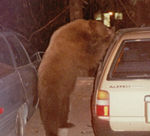
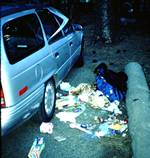
(We saw bear tracks in the snow in Yosemite on a January Ranger snowshoe walk, and bears have broken into vehicles in Yosemite every month of the year.)
No food storage in cars is now a park policy. Smart people realize this also means no dirty dishes, trash you didn’t want to deal with late at night, or even a stove because it has spilled food bits in places you can’t clean easily. The animals don’t know that soda can, cracker box or ice chest is empty, so deal with empties as you would with food. The spare can of motor oil is shaped like a food container so they’ll go after it, too. A daypack is a food storage container to an animal, so even an empty one should not be visible in a vehicle. ==== If possible, leave the vehicle interior empty at night or cover everything!====
Just because people are in the campsite or there is a big campfire burning does not mean that food not locked in a bear box is safe from animals. If you leave a box of groceries sitting while making trips back and forth from the car they’ll get into it, even though there may be people nearby. Raccoons may climb in through an open car door or into a truck bed and drag off a whole loaf of bread while you are unpacking.
- be certain someone stays in the back of the truck to guard gear from raccoons until it is all unloaded and dealt with
- make sure the car doors are shut as each item is unloaded so raccoons don’t get in
In the morning deer may wander through the campground. You’ll grab your camera to get a picture, forget about the sweet rolls on the picnic table, and before you know it, the deer are eating your breakfast.
Likewise while on a hike, leave your snacks in a daypack pocket, and leave the daypack on the ground, and ground squirrels can chew into the pack in seconds.
The raccoons are interested in even just licking dirty plates, so do dishes and clean up right after meals or put the stuff away in the bear box before you move to the campfire.
Pack the food for the trip carefully so you know where it all is, and so it’s all in the same containers. On the ’98 trip one girl (student body president) in a hurry to pack at the last minute stuffed some hot chocolate mix into her clothes duffel bag, and forgot it was there. When she arrived at the campsite, the duffel bag went into the tent. Shortly (within minutes) thereafter the raccoons snuck into the tent, dragged away the hot chocolate mix, and bothered people the rest of the trip looking for more.
There will be whole families of raccoons in the campsites.
(And raccoons know how to unzip tent doors !!!) (Putting a mini-padlock on a tent door zipper won’t keep raccoons or people out, they will just tear the tent fabric.)
The animals mostly don’t bother groups that are vigilant about food storage. If you are awake and being quiet you might hear a coyote sniffing around your tent in the middle of the night, but he won’t bother you if you were careful about food and scented things being put in the bearbox. If someone were to be so #X!*RRR! stupid as to feed any raccoons that come begging, they’ll get more aggressive and bother us the rest of the trip. These are not isolated incidents we are describing here, we need to be vigilant about not letting animals get our food. and we need to even pick up after other people. Violations can get you kicked off the trip and any fines will be paid by you, not the club / college.
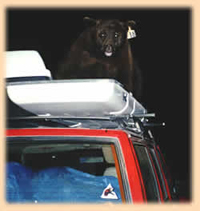
footprints on dirty window from a raccoon who inspected a car:
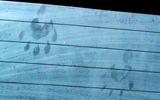
Don’t do dishes in the bathroom sinks. Dish water should be poured into the utility sinks (usually on the side of a restroom building), not poured on the ground.
Club campsites, and all restaurants, stores, visitor center, etc. in Yosemite are non-smoking. If you do smoke, park rules say no smoking while walking or hiking, or in any area with flammable materials. Put your butts in a litter bag, and dispose of them in a trash bin, not on the ground. If you smoke, it will constrict blood vessels to your fingers and toes and make them colder, so don’t smoke if your toes are cold or it can be painful. (Everyone on this trip will have cold toes sometime, smokers will likely be in pain.)
Don’t assume someone else brought the trash bag to the bin.
At bedtime, use a flashlight (electric torch) to check under the picnic table for lost potato chips and cooking items you forgot you set down on the ground during cooking.
Below: a cook set down a container of pasta sauce under a picnic table bench and forgot about it. We found it with a quick flashlight sweep before we all moved to the campfire.
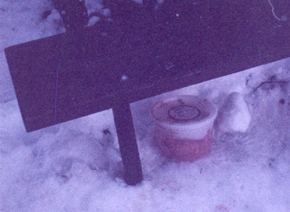
At bedtime, triple-check your day pack, jacket and pants pockets for candy bars or anything else that could attract animals into your tent.
Early Saturday morning on the 2013 trip we found a torn open pack sitting just outside the entrance to one of the two-person tents. A raccoon had opened the tent and dragged it out, not even waking the people inside. In the second photo, the camper, not knowing how his pack got there, was concerned that perhaps his camera had been stolen, but that was not what the raccoon wanted. In the foreground of the third picture you can see the yellow chocolate bar wrapper (he and the raccoon share a liking for Toblerone bars). Yes, everyone had been asked to triple check their day packs, pockets, etc., before putting gear in their tents. Yes, he and his tentmate could have been injured if they had woken up when the raccoon was getting the pack out of the tent.
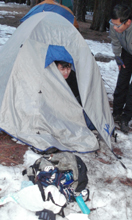
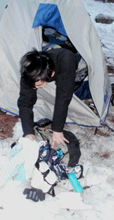
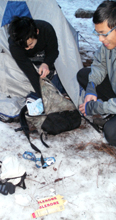
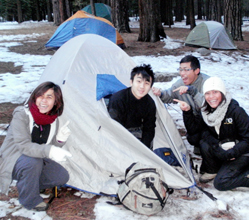
– – – – – – – – – – – – – – –
Don’t approach bears, but if one approaches you, or if a bear should enter camp, the park service says “act immediately. . . Yell, clap hands and bang pots together. If there is more than one person, stand together to present a more intimidating figure, but do not surround the bear.” Don’t do this if you are between a mama bear and her cub, or more importantly, NEVER get between mama and her cub (s). The same rules go for a bear you might meet on the trail. Report all incidents and sightings to a Ranger. Read more at: Bears
If animals get anything from you, NEVER try to get it back from them until they abandon it.
Immediately clean up any scattered garbage or food animals got into.
If you hike above the valley floor or ski away from the free groomed cross country trails at Badger Pass, you must do so in a group of minimum four people so if something happens to one of us there is someone to stay with the injured/ill person while two others go for help.
If you drive, before you make commitments to people about giving rides, be sure the vehicle is reliable enough to get to the event and home again, make arrangements for snow chains, get permission of any parent, etc. you need to borrow the vehicle from, get permission to drive in the snow from any parent etc. who would need to give permission AND you get time off from work.
Please have the courtesy to let your driver/ passengers know immediately of any changes to your ride needs or ability to drive.
We realize this seems like too many rules to some of you, but it is a De Anza sponsored trip, and we’d like to be able to keep doing adventurous events off campus.

Experienced campers can learn from:First-timer’s instructions That page is where you will find lots more food storage info and this photo (NOT taken on one of OUR trips!).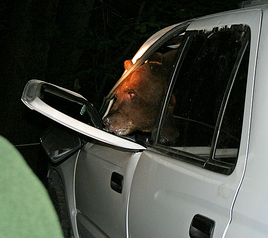
Learn to build Campfires that don’t smoke too much.
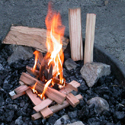
For a list of required equipment (and another list of the things you will really wish you had) as well as menu advice, and a discussion of what to look for in long-johns, fabrics and rain gear, go to:
We put info about any cheap rentals and other budget minded clothes ideas there.
Snow Camp is the main trip page.
Photos below by Eric Kulikoff http://www.redbubble.com/people/erickulikoff all rights reserved.
